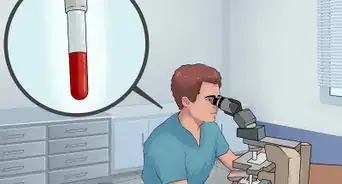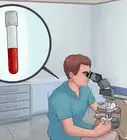This article was co-authored by wikiHow Staff. Our trained team of editors and researchers validate articles for accuracy and comprehensiveness. wikiHow's Content Management Team carefully monitors the work from our editorial staff to ensure that each article is backed by trusted research and meets our high quality standards.
There are 12 references cited in this article, which can be found at the bottom of the page.
wikiHow marks an article as reader-approved once it receives enough positive feedback. In this case, 94% of readers who voted found the article helpful, earning it our reader-approved status.
This article has been viewed 61,862 times.
Learn more...
Genetic counselors work with patients to assess the risks of hereditary diseases and medical conditions. A counselor analyzes and interprets data from medical histories and testing to identify the risk of a genetic condition. In addition to providing genetic testing, the counselor educates and counsels clients about risk factors in their medical history. This is a new and fast-growing field with great job prospects if you enjoy working on the cutting edge of medical science and helping patients with a variety of medical concerns.
Steps
Getting Your Education
-
1Prepare while in high school. High school is a bit away from actually getting a job as a genetic counselor. There are, however, certain steps you can take to prepare you for what comes next.[1]
- Take as many classes as you can in sciences like biology and chemistry. If your school offers Advanced Placement classes, take them and do the best you can on the exams.
- Learn more about genetics on your own. Read other books on genetics and read news articles both in papers and online about advances in the field. Genetics is a growing and rapidly changing field, and your classes may not be as up-to-date as you would like.[2]
- Look for volunteer positions in health clinics and genetics labs. Try to shadow a genetic counselor if you can.
- When applying to college, look for schools that have strong programs in genetics, biology, and psychology. These can give you an advantage when applying to masters programs down the road.[3]
- For help with any of this, talk to your guidance counselor about classes to take and outside opportunities to consider. He or she can help you plan out your high school career to get the most experience you can before college.
-
2Get a bachelor's degree. Becoming a genetics counselor requires an advanced degree, but before that, you need a bachelor's degree. The most common major fields include the medical sciences, psychology, and healthcare.
- If you do not major in one of those fields, you should at least have completed undergraduate coursework in the fields of biology, chemistry, organic chemistry, biochemistry, genetics, statistics, and psychology.
Advertisement -
3Volunteer for practical clinical experience. Graduate programs in genetic counseling will want to see practical experience in the field of counseling or genetics to go with your strong science grades. Look for opportunities to volunteer at clinics and shadow current counselors to make yourself a more attractive candidate, and see how much you really want to do the job.[4]
- Look for volunteering opportunities with counseling groups. Support groups for terminal illness, disabilities, or special needs, or peer counseling are all good experiences you can get in counseling. Volunteering to be a listener for a distress or suicide hotline is another good idea and an experience that is very desirable to master's programs. Not only will these all look good when you apply to graduate school, but they will also give you the opportunity to help people directly.
- You can also consider shadowing a current genetic counselor. Try to find a local genetic clinic and ask if you can shadow one of the counselors. You may also be able to volunteer directly with the clinic for some more hands-on experience, depending on the clinic’s needs.
- Don’t be afraid to ask your teachers, professors, and guidance counselors if they know of any other opportunities for shadowing or volunteering in genetics work.
-
4Earn a master's degree in genetic counseling. A genetic counselor is a masters-level position, so you will need to be accepted into an accredited master's program. Your master's program will involve coursework dealing with the study of genetics and counseling techniques. You will also do fieldwork where you spend time working directly in a professional setting, probably during the summer. You will finish the program with a thesis or “capstone” project that should involve original research in the field that draws on the information you have learned in classes.[5] [6]
- Admissions requirements vary between programs, but in most cases, you will need to have good grades in your undergraduate science classes, get a high score on the GRE, and have some practical experience.
- As of 2016, there are 35 programs in the United States and Canada accredited by the Accreditation Council for Genetic Counseling. A full list of the programs is available on their website.[7]
- You do not need to apply right as you finish your undergraduate degree. Taking some time between finishing your bachelor's degree and applying for a master's program can be a good opportunity to get some volunteering or practical experience.
Developing Your Professional Skills
-
1Develop a good knowledge of genomics. The centerpiece of your work will be studying and examining genetic science. Through work in high school, college, and post-graduate settings, you will study the field and develop a strong body of knowledge. Beyond this coursework, you should continue reading news articles and other sources for new developments in the field. The more you know, the more you will be able to provide good advice to your patients.[8]
-
2Become a good listener. In addition to learning about genetics, you will need to be comfortable in the role of a counselor. You should enjoy being compassionate and a good listener. Make sure you are prepared to give your patients your full attention when they talk to you and stay focused on the issues or symptoms they describe.
- Use positive and welcoming body language when patients speak with you. Lean slightly forward to let them know you are listening. Make eye contact and nod occasionally as they talk to keep your focus on them.
-
3Be compassionate. Genetic counselors who work with people directly will need to be comfortable having difficult conversations about pre-existing genetic conditions or possible genetic disorders. You will need to be able to be compassionate and enjoy helping people work through their concerns and difficulties.[9]
-
4Develop your skills of persuasion. There are a number of misconceptions about genetic testing, and you will probably need to convince patients of the benefits of getting tested. You will also need to be familiar with the testing process, to help alleviate any fears people may have.[10]
- Remain calm and confident. Part of being persuasive is the ability to alleviate your patient’s concerns. You can do this best by not getting angry or upset if they have questions, but calmly showing that you know what you are talking about and that you are sure it is the right decision.
- Body language is another key to building a rapport and letting your patient know you can be trusted. Match your patient’s positions and mirror his actions as a way to subtly suggest you are both on the same page. Simple motions like crossing your legs as he does, or putting your arms in a similar position should be enough.
- As you work with patients, you will probably encounter many of the same concerns and misconceptions. Develop some basic responses to these common issues, so you are always ready. There may be additional questions, but at least you will have something to start with.
Finding a Job
-
1Get certification from the American Board of Genetic Counseling (ABGC). The ABGC promotes the growth of genetic counseling and helps to set high standards for the profession. Once you have finished your master's program, you will need to pass the board’s examination to become a certified counselor.[11]
- The exam consists of 200 multiple-choice questions, and you will have 4 hours to complete it. The questions cover specific knowledge of genetics and your ability to address problems and situations that you may encounter while counseling. The ABGC provides content outlines and practice exams to help you prepare.[12]
- Your certification will be valid for 5 years after passing the exam. You will need to recertify at that point. This involves having taken a series of continuing education courses and paying recertification fees.
-
2Meet state licensing requirements. Some states require genetic counselors to obtain a license to practice counseling in the state. Licensure ensures the genetic counselor meets the minimum education requirements to work in the position. Make sure you know the rules and regulations in your state and have filled out the proper forms to receive a license.
- In Ohio, for example, a state license requires that you hold the proper master's degree, undergo a background check, and provide three recommendation certificates, including one from your current employer.
- As of August 2021, 28 states require licensure for genetics counselors including California, Connecticut, Delaware, Illinois, Indiana, Massachusetts, Nebraska, New Hampshire, New Jersey, New Mexico, North Dakota, Ohio, Oklahoma, Pennsylvania, South Dakota, Tennessee, Utah, and Washington. [13]
-
3Figure out the setting you want to work in. Genetic counselors work in a variety of settings. These include clinical practices in doctors’ offices and hospitals, or doing research for biotechnology companies, government agencies, or university laboratories.[14]
- Patient-focused counseling. This will involve working directly with people, and discussing their needs and concerns. You can choose to work closely with different specialties, including pregnant women, children, cancer patients, or heart patients. You will be based in a hospital or doctor’s office.
- Laboratory-focused counseling. This will involve creating a research agenda to study different aspects of genetic science. You may be involved in directing and studying clinical trials, or researching genetic conditions. You will work in a lab, either with a genetic research company or a university. This kind of work can be done part-time along with patient-focused work to still work directly with individuals.
- Community or public health-focused counseling. These fields include working for non-profit organizations and government agencies to reach specific groups of people. You may work with Newborn Screening programs or patient support groups to reach people who may not come directly to clinics or hospitals.
-
4Find a job. Depending on the type of work you want to do, look for openings with hospitals, laboratories, clinics, or other places seeking trained genetic counselors. You can find these through regular job sources like newspaper and online advertisement sites, by contacting hospitals and laboratories directly, or by looking through the websites of the ABGC and National Society of Genetic Counselors (NSGC).[15]
- Genetic counseling is a rapidly growing field, so once you are certified and licensed, your job prospects should be very strong. New developments in genetics mean that new openings, and even new types of work, are becoming available. Be prepared to be flexible with the types of genetic work you would like to do, as well as where you might want to live, to maximize your chances of landing a good job.[16]
-
5Participate in other professional activities. In addition to your regular job as a counselor, there are a number of other opportunities to share what you are doing with others. This can be working with other professional counselors, or looking for opportunities to teach the next generation of genetic counselors.
- Publish articles in professional journals. The most prominent journal for genetic counselors is the Journal of Genetic Counseling, published by the National Society for Genetic Counselors. Another good journal is the American Journal of Human Genetics. These are great opportunities to publish research you might be doing on genetics or counseling people on genetic disorders.
- Join professional societies. In addition to being part of the ABGC, consider joining other professional organizations. The other prominent group in the US is the National Society of Genetic Counselors. Others include the American Society of Human Genetics, the Genetics Society of America, and the International Genetics Education Network. The best one to join will depend on the kind of work you do as a counselor.
- Find opportunities to teach others. In many cases, teaching future geneticists will involve introducing students to the basic science of genetics, and understanding how it fits into broader sciences like biology. If you are interested in teaching genetic counseling in a masters program, you will need to earn a doctorate in genetics, neuroscience, biology, or a similar field, and publish peer-reviewed research. You can also be open to allowing future genetic counselors to shadow you to help give them professional opportunities.
-
6Take continuing education courses. To maintain your certification with ABGC, you will need at least 25 hours of continuing education credits. Some states require additional credits as part of maintaining the state license, while certain hospitals and laboratories may want them as a condition for maintaining employment.
- Approved courses are available through the ABGC and NSGC and cover new developments in the fields of genetics and patient care. Available courses will depend on your current job status as well as the type of information you are looking to cover.
- In addition, professional activities including scholarly publications, teaching, public outreach, and peer supervision can qualify as part of your continuing education.
- Because genetics is a field undergoing rapid development, it is important that you keep up with new trends and ideas to give your patients the best care possible. Failing to do so will prevent you from being able to maintain your certification and advance in your career.
Warnings
- Working as a genetic counselor is a very time-consuming job. Your first meetings with individuals or families may take some time to explain the processes involved. These meetings will also require significant preparation, including tracking down medical records, drawing out family histories, and researching possible diagnoses and options for your clients.⧼thumbs_response⧽
- While genetic counseling is a growth field, it is still extremely competitive. You will need strong grades to get into a program, and persistence to get one of the few specialized jobs available.[17]⧼thumbs_response⧽
References
- ↑ https://college.mayo.edu/academics/explore-health-care-careers/careers-a-z/genetic-counselor/
- ↑ https://www.sciencemag.org/careers/2016/06/genetic-counseling-growing-area-opportunity
- ↑ https://explorehealthcareers.org/career/allied-health-professions/genetic-counselor/
- ↑ https://www.purdue.edu/preprofessional/Documents/Genetic%20Counseling.pdf
- ↑ http://www.bumc.bu.edu/gms/m-s-genetic-counseling-program/curriculum/
- ↑ http://geneticcounseling.med.sc.edu/curriculum.asp
- ↑ http://gceducation.org/Pages/Accredited-Programs.aspx
- ↑ https://college.mayo.edu/academics/explore-health-care-careers/careers-a-z/genetic-counselor/
- ↑ https://www.purdue.edu/preprofessional/Documents/Genetic%20Counseling.pdf
- ↑ https://college.mayo.edu/academics/explore-health-care-careers/careers-a-z/genetic-counselor/
- ↑ https://www.sciencemag.org/careers/2016/06/genetic-counseling-growing-area-opportunity
- ↑ https://www.abgc.net/ABGC/media/Documents/ABGC-Handbook-April-2021_WEB-final.pdf
- ↑ https://www.nsgc.org/Policy-Research-and-Publications/State-Licensure-for-Genetic-Counselors/States-Issuing-Licenses
- ↑ https://college.mayo.edu/academics/explore-health-care-careers/careers-a-z/genetic-counselor/
- ↑ http://www.nsgc.org/
- ↑ http://www.bls.gov/ooh/healthcare/genetic-counselors.htm#tab-6
- ↑ http://www.pennlive.com/bodyandmind/index.ssf/2012/02/5_questions_about_working_as_a_19.html
About This Article
If you want to become a genetic counselor, start early by taking as many biology and chemistry classes as you can in high school. After high school, pursue a bachelor’s degree in the medical sciences, psychology, or healthcare. While these majors aren’t required to get an advanced degree in genetic counseling, they will make it easier. Since graduate programs will want to see that you have practical experience, look for volunteer opportunities at clinics to make yourself a more attractive candidate. Once you have a bachelor’s degree, apply to an accredited master’s program for genetic counseling, where you’ll work on a thesis that includes original research in the field. Afterward, you'll need to pass the American Board of Genetic Counseling’s certification exam and acquire any licenses required by your state before you can apply for a job as a genetic counselor. For more help, including how to find a job as a genetic counselor, read on!



































































